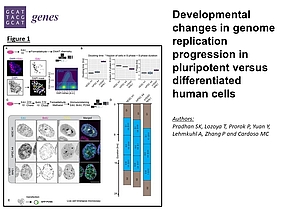New publication from the Cardoso lab on the developmental changes in genome replication progression in pluripotent versus differentiated human cells
Pradhan SK, Lozoya T, Prorok P, Yuan Y, Lehmkuhl A, Zhang P and Cardoso MC (2024) Developmental Changes in Genome Replication Progression in Pluripotent versus Differentiated Human Cells. Genes (Basel), doi.org/10.3390/genes15030305
Abstract:
DNA replication is a fundamental process ensuring the maintenance of the genome each time cells divide. This is particularly relevant early in development when cells divide profusely, later giving rise to entire organs. Here, we analyze and compare the genome replication progression in human embryonic stem cells, induced pluripotent stem cells, and differentiated cells. Using single-cell microscopic approaches, we map the spatio-temporal genome replication as a function of chromatin marks/compaction level. Furthermore, we mapped the replication timing of subchromosomal tandem repeat regions and interspersed repeat sequence elements. Albeit the majority of these genomic repeats did not change their replication timing from pluripotent to differentiated cells, we found developmental changes in the replication timing of rDNA repeats. Comparing single-cell super-resolution microscopic data with data from genome-wide sequencing approaches showed comparable numbers of replicons and large overlap in origins numbers and genomic location among developmental states with a generally higher origin variability in pluripotent cells. Using ratiometric analysis of incorporated nucleotides normalized per replisome in single cells, we uncovered differences in fork speed throughout the S phase in pluripotent cells but not in somatic cells. Altogether, our data define similarities and differences on the replication program and characteristics in human cells at different developmental states.
Read the full paper here: https://www.mdpi.com/2073-4425/15/3/305

